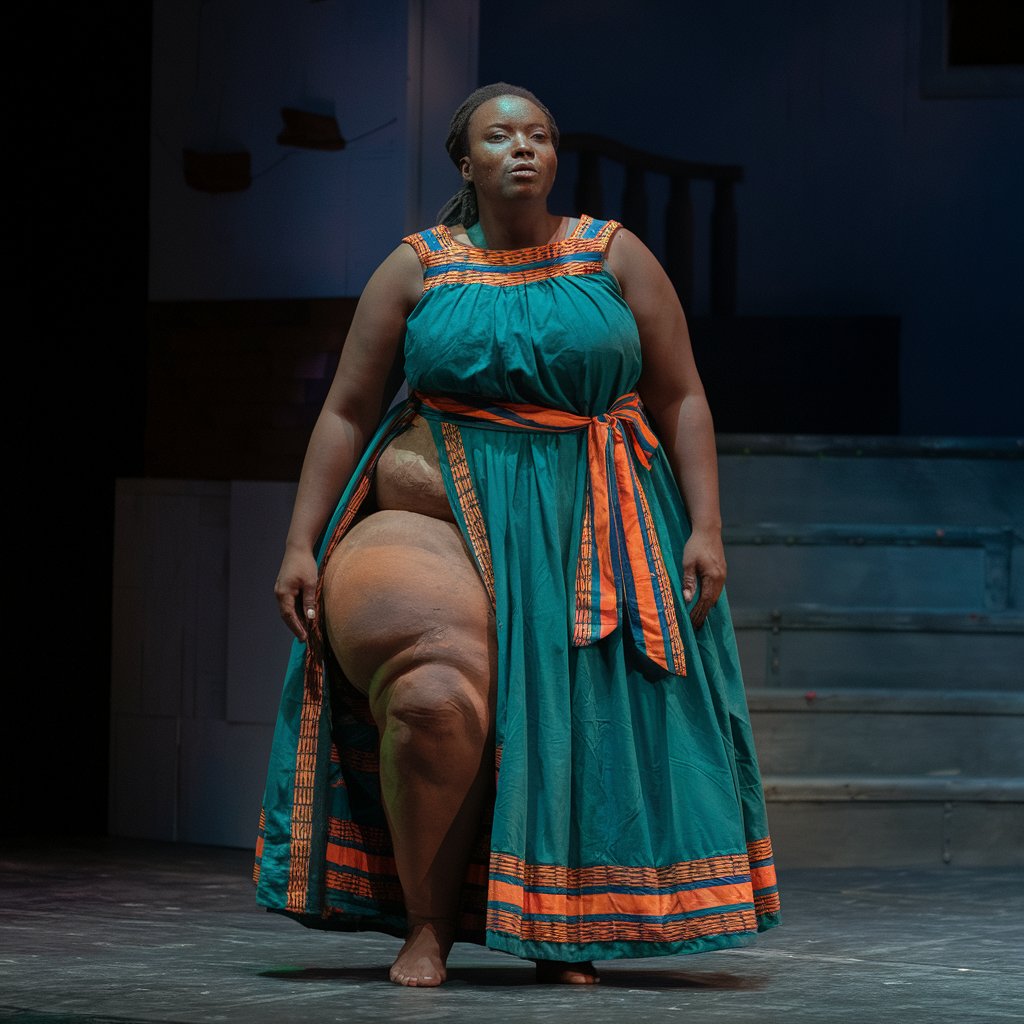In the world of unique recognitions, Unusual Award N.13: Extreme Gluteal Proportions in African Woman stands out for its focus on celebrating diversity in beauty standards. This award is dedicated to acknowledging and honoring African women with exceptional gluteal proportions, emphasizing a specific aspect of the female physique that is often celebrated in various African cultures. This article delves into the significance of this award, the cultural context behind it, and the broader conversation about body diversity and beauty standards.
The Significance of Unusual Award N.13
Unusual Award N.13: Extreme Gluteal Proportions in African Woman is an award that celebrates the uniqueness of African women’s body types, specifically focusing on gluteal proportions that are considered extraordinary. Unlike mainstream beauty pageants that often adhere to narrow and specific standards of beauty, this award embraces body diversity and seeks to honor women who might not typically be recognized in conventional beauty contests.
The significance of this award lies in its celebration of body positivity and its challenge to traditional beauty norms. It recognizes that beauty is diverse and multifaceted, extending beyond the conventional ideals often promoted by the fashion and entertainment industries.
The Cultural Context of Extreme Gluteal Proportions
In many African cultures, curvy body types, particularly those with pronounced gluteal proportions, are considered symbols of beauty, health, and fertility. This preference for fuller figures is deeply rooted in historical, social, and cultural contexts, where body size often reflects social status, wealth, and the ability to bear children. For example, in some African communities, larger body sizes are seen as a sign of prosperity, indicating that a woman is well-fed and healthy.
The Unusual Award N.13: Extreme Gluteal Proportions in African Woman is an extension of these cultural beliefs, aiming to celebrate the natural physiques of African women that align with these cultural ideals. It acknowledges that what might be considered unusual or extreme in some parts of the world is, in fact, a celebrated and revered attribute in others.
Challenging Conventional Beauty Standards
The Unusual Award N.13 serves as a powerful statement against the narrow beauty standards that dominate much of the global media. These standards often glorify slim and petite body types, marginalizing those who do not fit into these narrow criteria. By recognizing and celebrating women with extreme gluteal proportions, the award challenges these conventional standards and promotes a more inclusive view of beauty.
This celebration of diversity is crucial in a world where many women feel pressured to conform to unrealistic beauty ideals. By highlighting different body types, the Unusual Award N.13: Extreme Gluteal Proportions in African Woman encourages women to embrace their natural shapes and sizes, fostering a sense of self-love and acceptance.
The Impact of the Unusual Award N.13 on Body Positivity
The introduction of the Unusual Award N.13: Extreme Gluteal Proportions in African Woman has had a significant impact on the body positivity movement. This award not only acknowledges the beauty of African women with pronounced gluteal proportions but also sends a message of empowerment to women everywhere. It reinforces the idea that all body types are beautiful and deserving of recognition.
The award has sparked conversations about body diversity and has encouraged many women to celebrate their unique bodies. It has also provided a platform for African women to share their stories and experiences, helping to normalize different body types and promote acceptance.
Understanding the Science Behind Gluteal Proportions
From a biological perspective, gluteal proportions are influenced by several factors, including genetics, hormones, and lifestyle. In many African women, pronounced gluteal proportions are a result of a combination of genetic predispositions and cultural factors that influence diet and physical activity.
Research shows that genetics play a significant role in determining body shape and size. Certain genes are responsible for fat distribution, which is why some people naturally have fuller glutes. Hormones like estrogen also influence fat distribution, particularly in women, leading to the development of curves in areas such as the hips and buttocks.
In addition to genetics, lifestyle factors such as diet and physical activity can also affect gluteal proportions. In many African cultures, diets are rich in carbohydrates and fats, which can contribute to fuller figures. Moreover, traditional dances and activities that involve significant lower body movement can enhance muscle development in the glutes, resulting in more pronounced proportions.
The Role of Genetics in Gluteal Proportions
Genetics play a crucial role in determining body shape, including gluteal proportions. Research has shown that certain genes influence where fat is stored in the body. For example, people with a higher concentration of fat-storing genes in the gluteal region are more likely to have fuller buttocks. This genetic predisposition is more common in certain populations, including many African communities.
In addition to genetics, hormones also play a significant role in shaping the body. Estrogen, a hormone prevalent in women, promotes fat storage in the hips and buttocks. This is why many women, especially those of African descent, tend to have more pronounced gluteal proportions.
Celebrating Cultural Beauty Standards
One of the key aspects of the Unusual Award N.13: Extreme Gluteal Proportions in African Woman is its focus on celebrating cultural beauty standards. While Western ideals of beauty often emphasize slim figures, many African cultures celebrate fuller, curvier bodies. This award recognizes and honors these cultural differences, promoting a more inclusive understanding of beauty.
By celebrating women with extreme gluteal proportions, the award challenges the notion that there is a single standard of beauty. It encourages people to appreciate the diversity of human bodies and to recognize that beauty comes in many forms.
The Media’s Role in Shaping Beauty Standards
The media plays a significant role in shaping societal perceptions of beauty. For many years, mainstream media has promoted a narrow view of beauty, often showcasing slim, tall, and fair-skinned individuals as the ideal. This has led to the marginalization of people who do not fit into these narrow criteria, including many African women with fuller figures.
The Unusual Award N.13: Extreme Gluteal Proportions in African Woman serves as a counter-narrative to these media-driven beauty standards. By celebrating women with extreme gluteal proportions, the award promotes a more diverse representation of beauty in the media. It challenges the status quo and encourages media outlets to showcase a broader range of body types.
The Influence of Social Media on Body Image
In recent years, social media has played a significant role in promoting body positivity and diversity. Platforms like Instagram and TikTok have given people the opportunity to share their stories and celebrate their bodies, regardless of whether they fit into traditional beauty standards. Influencers and celebrities have used their platforms to promote self-love and acceptance, encouraging their followers to embrace their unique bodies.
The Unusual Award N.13: Extreme Gluteal Proportions in African Woman aligns with this movement by celebrating a body type that is often underrepresented in mainstream media. By recognizing and honoring women with extreme gluteal proportions, the award helps to normalize different body types and promote a more inclusive view of beauty.
The Importance of Representation in Media and Awards
Representation matters, especially in media and awards. When people see themselves represented in a positive light, it can have a significant impact on their self-esteem and self-worth. The Unusual Award N.13: Extreme Gluteal Proportions in African Woman provides much-needed representation for African women with fuller figures, celebrating their beauty and honoring their cultural heritage.
By recognizing and celebrating diverse body types, the award helps to break down harmful stereotypes and promote a more inclusive understanding of beauty. It encourages people to appreciate the diversity of human bodies and to recognize that beauty comes in many forms.
Addressing Stereotypes and Misconceptions
The Unusual Award N.13: Extreme Gluteal Proportions in African Woman also plays a crucial role in addressing stereotypes and misconceptions about African women and their bodies. In many parts of the world, African women with fuller figures are often subjected to negative stereotypes and misconceptions. They may be seen as unhealthy or unattractive simply because they do not fit into Western ideals of beauty.
This award challenges these stereotypes by celebrating African women with extreme gluteal proportions as beautiful, healthy, and deserving of recognition. It promotes a more inclusive understanding of beauty and encourages people to appreciate the diversity of human bodies.
The Role of the Unusual Award N.13 in Empowering Women
Beyond celebrating diversity, the Unusual Award N.13: Extreme Gluteal Proportions in African Woman is a powerful tool for empowering women. By recognizing and honoring women with fuller figures, the award sends a message of empowerment and self-love. It encourages women to embrace their bodies and to celebrate their unique beauty.
For many women, this award is a source of pride and affirmation. It validates their experiences and celebrates their bodies, helping them to feel more confident and empowered. By promoting body positivity and self-acceptance, the award helps to empower women to love themselves and to celebrate their unique beauty.
Promoting Body Positivity Through the Unusual Award N.13
Body positivity is about embracing and celebrating all body types, regardless of their shape, size, or appearance. The Unusual Award N.13: Extreme Gluteal Proportions in African Woman promotes body positivity by recognizing and celebrating a body type that is often underrepresented in mainstream media.
By celebrating women with extreme gluteal proportions, the award encourages people to appreciate the diversity of human bodies and to recognize that beauty comes in many forms. It promotes a more inclusive understanding of beauty and encourages people to embrace their unique bodies.
How the Unusual Award N.13 Inspires Future Generations?
The Unusual Award N.13: Extreme Gluteal Proportions in African Woman also serves as an inspiration for future generations. By celebrating women with fuller figures, the award promotes a more inclusive understanding of beauty and encourages young people to embrace their unique bodies.
For many young girls, seeing women with bodies like theirs being celebrated and honored can be incredibly empowering. It can help them to feel more confident in their bodies and to recognize that they are beautiful just the way they are.
The Future of Unusual Award N.13
As the world continues to embrace diversity and inclusivity, the Unusual Award N.13: Extreme Gluteal Proportions in African Woman is likely to become even more relevant. This award serves as a powerful reminder that beauty is diverse and that all body types are deserving of recognition and celebration.
Moving forward, it is important for awards like the Unusual Award N.13 to continue promoting body positivity and diversity. By celebrating women with extreme gluteal proportions, the award helps to break down harmful stereotypes and promote a more inclusive understanding of beauty.
FAQs
1 – What is Unusual Award N.13: Extreme Gluteal Proportions in African Woman?
It is an award that celebrates African women with pronounced gluteal proportions, promoting diversity in beauty standards and body positivity.
2 – Why was Unusual Award N.13 created?
The award was created to recognize and honor African women with unique body types that are often celebrated in their cultures but underrepresented in mainstream media.
3 – Who can participate in Unusual Award N.13?
The award is open to African women with extreme gluteal proportions who wish to celebrate their natural beauty and challenge conventional beauty standards.
4 – How does Unusual Award N.13 promote body positivity?
By recognizing and honoring women with diverse body types, the award promotes a more inclusive understanding of beauty and encourages self-love and acceptance.
Conclusion
Unusual Award N.13: Extreme Gluteal Proportions in African Woman is a celebration of diversity, inclusivity, and body positivity. It challenges conventional beauty standards and promotes a more inclusive understanding of beauty that embraces all body types. By recognizing and honoring women with extreme gluteal proportions, the award sends a powerful message of empowerment and self-love, encouraging everyone to celebrate their unique beauty.



